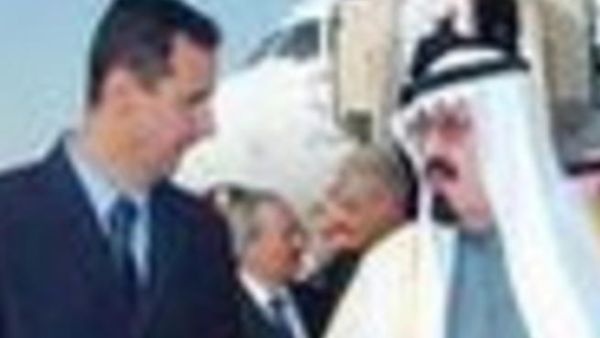With every passing day, the number of reports emanating from the Middle East regarding the widening rift between Syria and Saudi Arabia grows. In his recent piquant speech following the UN-brokered cease-fire between Lebanon and Israel, Syrian President Bashar Al Assad eluded to several Arab leaders whom he refrained from mentioning by name. Assad’s message to many fellow Arab leaders was less than kind.
The move succeeded only in heightening tensions between the countries referenced in his speech, as well as their leaders, whom Assad referred to as “half-men” who failed to support Hizbullah in its valiant fight against Israel. No doubt, Saudi and Egyptian regimes were included in the Syrian leader’s diatribe.
To this day, political leaders in both Saudi Arabia and Egypt, for instance, are finding it difficult to overcome the indirect insult to their ability to courageously lead the Arab world with honor by their fellow Arab ruler, Assad.
Recently, an unofficial Syrian news source vehemently attacked the Saudi kingdom’s political echelon with unprecedented intensity. A decision had apparently been made by the Saudi kingdom, according to the Syrian internet news source, to overthrow the Assad regime in Syria.
Analysts consider Assad's speech as the straw that broke the camel's back with regard to the ties with Saudi Arabia. According to them, since 2000, when Bashar succeeded his father, differences between the two countries floated on the surface and Lebanon was key to them. The conflict between Syria and Saudi Arabia became open after the assassination of former Lebanese PM Rafik Hariri, a close associate to the Saudi palace and a bitter rival for Damascus.
Now, following the war in Lebanon, Saudi Arabia’s Foreign Minister, Saud Al Faisal, had apparently handed over the “Syrian Portfolio” to Bandar Bin Sultan, the former Saudi Arabian ambassador to Washington, the report said. Syrian sources maintain that Bandar had previously met with former Syrian vice-president Abdul Halim Khaddam and one of the leading opposition figures to rise against the Assad regime in recent months.
At the same time, Arab sources report that recently, Saudi Arabia refused to receive a delegate representing the Syrian leader, through whom an attempt was to be made by Assad to explain the portions of his speech which caused such a ruckus in the Kingdom. The delegate, added sources, was to have arranged a meeting with King Abdullah to curb rising tensions.
Though the identity of the Syrian delegate has yet to be revealed officially, it appears that he is none other than Syria’s Foreign Minister, Walid Mualem.
In the meantime, the Saudis appear to be unwilling to pay heed to Assad’s overtures. Moreover, sources close to the Saudi ruler maintain that in addition to his recent insults, the Syrian president has also in the past failed on more than one occasion to meet commitments made to the Saudi king.







